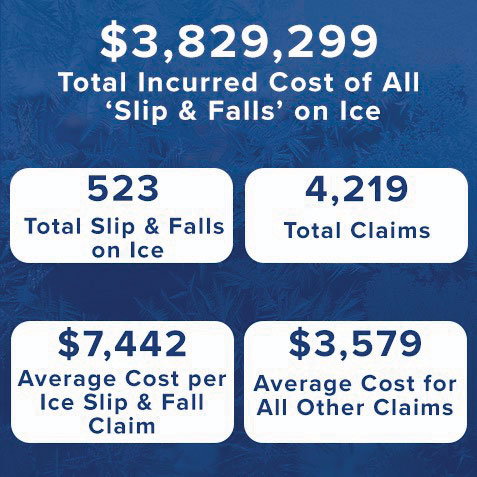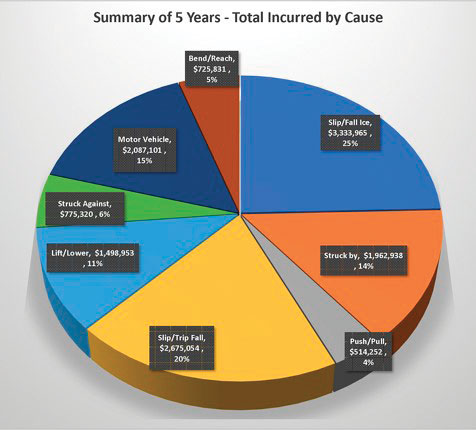By Pat Austin, Loss Prevention Representative
Is your business prepared for the winter?
The winter may conjure up comfort with imagery of falling snow, sitting by a fire, hitting the slopes, and the holidays, but the cold hard truth is that the business impact of winter weather is anything but idyllic.
The economic impact of a simple snowstorm can cost your business. In this article, we will explore how winter weather impacts business, what businesses can do to effectively prepare for and react to inclement weather, and employee communication best practices for ensuring safety, productivity, and business continuity all winter long.
How winter threatens your business
Winter weather is a great threat to employee safety. The danger begins on their way to work. In fact, each year, nearly 1,300 people are killed in vehicle crashes due to winter weather conditions.
The risks presented by winter weather extend beyond driving. ‘On-ice slip and fall’ injuries and seasonal illnesses affect nearly all businesses. These threats can reduce productivity, lower staff morale, and disrupt business workflows.
A dive into the data from our own Workers’ Compensation Trust from 2015 to present exhibits exactly how much of a threat and how costly slip and falls on ice are to NHADA membership.
Slip and falls on ice account for 23% of all dollars spent in that five year period, but only 12% of the total number of claims. Slip and falls on ice are more serious and more expensive on average than any other type of injury that occurs.
The indirect effects of winter weather are also a factor. These factors include school delays and closings, postponement of meetings, and disruption of normal business operations. When employees’ attention is taken away from the organization and shifted to the pressing needs of the day, employee engagement and productivity take a hit.

Preparing your business for winter weather
In New Hampshire, we are all aware of the inherent risks associated with winter weather, and we have the ability to plan for, mitigate, and even eliminate the risks our employees and businesses encounter.
Step 1: Assess your risks
Below is a list of some of the potential winter weather hazards your employees and business will face:
- Unsafe driving conditions
- Slip and fall on ice injuries
- Seasonal illnesses
- Frostbite
- Power outages
- School delays and closures
- Structural stress and damage to buildings
As a company, the focus should be on forming an action plan and communicating with employees in regards to each risk.

Step 2: Who is responsible?
• Preparation is key. The time to figure out who is responsible is not in the midst or after the fact. Having answers to the questions below prior to a winter weather event will keep your business ahead of the “storm.”
- Who needs to ensure the parking lot is safe
and drivable? - Who will track winter weather activity and communicate winter weather-related information
to employees? - Assemble a “Winter Weather Preparedness team” involving all departments (HR, Facilities, Sales, Service, etc.) and clearly outline roles and responsibilities
• As an employer, you are responsible for the health and safety of all of your employees. It is your company’s responsibility to ensure all necessary safety precautions are taken, even if these precautionary measures are taken by a third party. Before the winter weather hits, we recommend:
- Reviewing all your contracts with vendors
- Insurance providers
- Property managers
- Landlords
This type of preparedness will help eliminate confusion and in-action when it matters most.
Step 3: Execution of your plan
Now that you have identified the risk factors and established who is responsible for the execution, it is important a specific plan for each “Winter Weather Preparedness” team member be created to help keep everyone on the same page.
The NHADA Loss Prevention team has developed a checklist of things you and others must do before, during, and after each winter weather event. This type of preparedness will help you identify and obtain any tools or materials needed to keep your employees and customers safe.
In addition, the NHADA Loss Prevention staff encourages you to train all employees on the topic of winter safety because even the best plans fall short if everyone is not educated and on the same page. Please contact your NHADA Loss Prevention Representative to discuss the various options of a customized “Slip Fall on Ice Prevention Training.”
Don’t let winter weather wreck your bottom line
Proper preparation and communication can prevent winter weather from putting your business on ice.
Pat Austin, Loss Prevention Representative
For ideas and assistance with establishing a strong winter weather preparedness plan please contact the NHADA Loss Prevention Department at 1-800-852-3372 or email Pat Austin at paustin@nhada.com
This story appears in the 2020 Issue 6 of Drive: NH Magazine.







